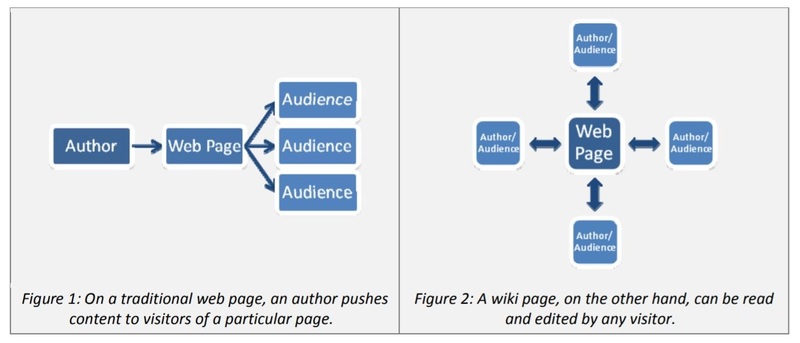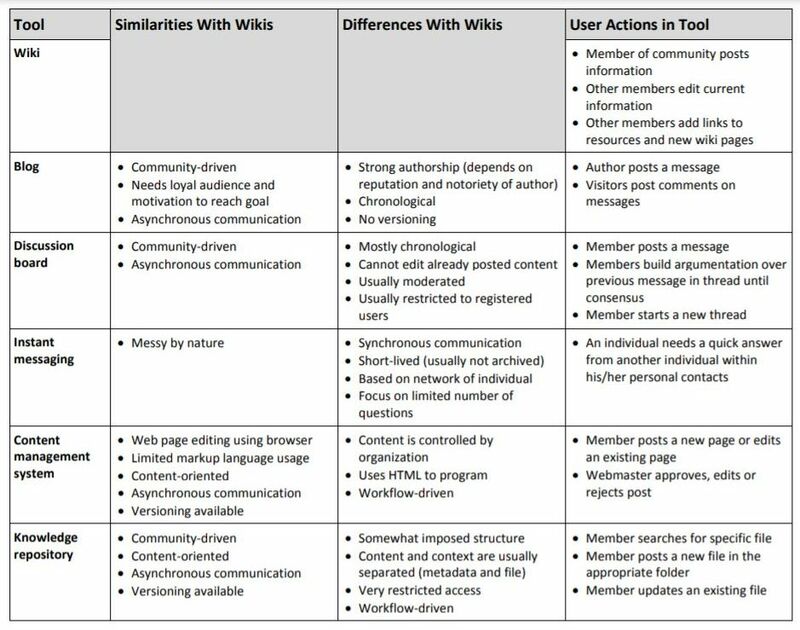e-Learning Ecologies MOOC’s Updates
Wikis an Effective Tool for Educators
A wiki is a website where users can edit or add content onto a web page with a web browser. Wikis fall under the group of Web 2.0 technologies which are thought to facilitate collaboration by promoting interaction with online content (Alexander, 2006).
Different wiki services offer different features, although they commonly include the ability to compare previous versions of a page, discuss issues prior to making changes and track who edited what and when. Probably the most well known public wiki is Wikipedia, an online encyclopaedia (Grant, 2006).
Figures 1 represents a traditional web page editing and publishing process, where the author pushes content to a passive crowd of internet users. Figure 2, on the other hand, illustrates what a wiki web page is: a page that is readable and editable by every user (URL-1).
Adopting technology in education can be very challenging. Research studies document many barriers (lack of resources, lack of education, etc). Wikis have become an increasingly popular form of technology use in classrooms. Educators and teachers are using Wikis as an effective teaching and learning tool to enhance the learning process. Collaboration is an important part of teaching and learning. And Wikis can facilitate collaboration. Wikis can be used to engage learners in learning with others. (Kurt, 2017).
Wikis have been called “an effective tool for educators” (Robinson, 2006). They enable students to collaborate in a space that is immediately updated (Bold, 2006). The wiki is most commonly used in the classroom as a computer supported collaborative environment. Because of their simple features, wikis can be appropriate for students and teachers at all levels. Wikis can be used to encourage collaboration among students by allowing them to read and edit each other’s work. Collaborative writing assignments with wikis encourage students to review each other’s pieces and truly reflect on and critique what is being put together instead of just pasting separate components together (Ben-Zvi, 2007). Each time a wiki is edited, a separate tracking feature makes note of what changes were made and who made those changes. Wiki users can also create signatures to accompany any edits they make (Augar, Raitman, and Zhou, 2004). Wikis can be used to facilitate ongoing, thought-provoking discussions about many topics over the course of semesters or academic years.
The principal advantages of wikis are similar in traditional classrooms and in hybrid or online courses as a mode of gathering information, a mode of assessment, and a way to foster collaboration and engagement among students (Kurt, 2017).
While there are a number of similarities between wikis and other web tools, there are also some significant differences. Table 1 presents the similarities, the differences, and the most common usages of blogs, discussion boards, instant messaging, content management systems, and knowledge repositories in comparison with wikis (URL-1).
Advantages of wikis include (Kurt,2017):
- Offer content access at all times, no matter where the user is located
- Support many forms of media, including URLs, photos, videos, and music
- Let the user view every change and entry for group assignments
- Collect information from student groups
- Allow for collaboration in writing of assignment or course reviews
- Offer a highly useful resource for teamwork and conversation at a low cost
- Allow for detailed reading, modification, and recording of each draft
- Foster collaboration between teachers and students in the design and implementation of uncomplicated webpages
- Encourage peer review and editing in group assignments
- Allow for collaborative authoring of projects and assignments
- Offer an alternative to traditional presentation tools like PowerPoint
- Provide an environmentally-friendly alternative to paper-based assignments
- Allow for easy tracking of deadline compliance thanks to date and time stamps
- Show all revisions, offering options like reverting to former versions and ability to undo changes
Wikis are used to support a large number of different activities. Here are some of the most common ways wikis are used (URL-1).
- Brainstorming: When starting a specific project or a creative process, participants are invited to add items and thoughts on a wiki. They are also asked to link all these random thoughts and concept together in order to stimulate creativity.
- Group project: A wiki can act as a private intranet for a specific group project so all participants can communicate, share resources (including texts, videos, spreadsheets, links, etc.), and write a report or a book together.
- Meeting support: An agenda for a specific meeting is posted on a wiki and participants are invited to consult and edit it prior to a meeting. The wiki is edited during the meeting to include was discussed. Participants can later use the wiki to post missing information or follow‐up items. This technique is also very useful for training, presentations, and birds of a feather sessions during conferences.
- Make lists: From a list of best restaurants in town to a glossary of terms used in a specific field of expertise, a wiki is a great way to organize this kind of content. In the same spirit, wikis can also be used to build an online repository of relevant documents or FAQs.
- Collections of links: Wikis can be used for social bookmarking. They give to all participants the possibility to post, comment, group, and classify links of all nature or in a specific field of expertise.
- Writing a collective letter, position, statement, web content: When writing something that is intended for an official legal instance, to clients, to upper management or to the general public, a wiki is an excellent tool to reach a consensus, define key ideas, and write down the content to be clear and non‐offensive.
- Building a group portfolio: Any organization can use a wiki to post past projects, testimonials from clients, history of the organization, etc. This kind of portfolio is a powerful marketing tool.
Tools:
Sites that offer free wiki hosting for educators
Wikispaces : Designed specifically for use in the classroom, wikispaces is a social writing platform that also acts as a classroom management tool by keeping teacher and students organized and on task. Not only does this site provide easy to use templates, it’s free and also has a variety of assessment tools. Teachers can also use wikispaces to create assignments and share resources.
Wikidot :At its most basic level, this website is free to users. Some of its features include easy to use website templates with unlimited pages, free web hosting and domain name, control over ads, and the chance to earn some money with ads, which can be used for the next class trip.
PbWorks : With over 300,000 education based workspaces, this wiki-like website offers educators a range of options that encourage student-centered learning. Students can build web sites or web pages that can be shared with other students and staff.
Example Wiki Pages:
Let's look at some examples of how educators are using wikis:
- Dr. Tina Loo, Professor of History, The University of British Columbia| HIST396: Environmental History of North America
- Dr. Rose-Marie Dechaine, Professor of Linguistics, The University of British Columbia| LING300: Studies in Grammar
- Dr. Janice Stewart, Dr. Lori Macintosh, Professors in the Institute of Gender, Race, Sexuality, and Social Justice , The University of British Columbia | GRSJ224A: Gender, Race, Sexuality, and Social Justice in Literature
Conclusion:
As a faculty member, you might choose not to use a wiki in your course. But students are now empowered in the use of web 2.0 technologies. They are using Facebook or Google Docs to create study groups. They are using their cellphones to keep in touch with their friends through social networking applications, texting each other in real time, accessing the web to find the information they need just‐in‐time. The impact of technology on society is clearly observable. As educators, it is our duty to reflect on these technologies and behaviors in order to detect and implement innovative ways to enhance student learning and develop their 21st century skills, the ones they will need to survive professionally in a highly networked environment (URL-1).
What does the research say about wikis?
Research on wikis is still emerging, here you can find some recent articles:
Why Wikis? Student Perceptions of Using Wikis in Online Coursework
Is wiki an effective platform for group course work?
Wiki and Threaded Discussion for Online Collaborative Activities: Students’ Perceptions and Use
Wikis for Teaching and Learning
Open Content, Open Learning 2.0: Using Wikis and Blogs in Higher Education
Videos:
References:
Alexander, B. (2006), “Web 2.0: a new wave of innovation for teaching and learning?” Educase Review 41, 32–44. Retrieved on July 30, 2021, from https://er.educause.edu/-/media/files/article-downloads/erm0621.pdf
Augar, N., Raitman, R., & Zhou, W. (2004), “Teaching and learning online with wikis”, Proceedings of ASCILITE, pp. 95-104. Retrieved on July 30, 2021 https://www.ascilite.org/conferences/perth04/procs/pdf/augar.pdf
Ben-Zvi, D. (2007), “Using wiki to promote collaborative learning in statistics education”, Technology Innovations in Statistics Education, 1(1). Retrieved on July 30, 2021 http://repositories.cdlib.org/uclastat/cts/tise/vol1/iss1/art4
Bold, M. (2006), “Use of wikis in graduate course work”, Journal of Interactive Learning Research, 17(1), pp. 5-14.
Grant, L. (2006), “Using Wikis in Schools: a Case Study”, FutureLab. Retrieved on July 30, 2021 https://www.nfer.ac.uk/publications/futl98/futl98.pdf
Kurt, S. (2017). "Wikis in Education: How Wikis are Being Used in the Classroom," in Educational Technology, September 13, 2017. Retrieved on July 30 from https://educationaltechnology.net/wikis-in-education/
Pappas, C. (2013), “How To Use Wiki In The Classroom”, eLearningIndustry. Retrieved on July 30 from, 2021 https://elearningindustry.com/how-to-use-wiki-in-the-classroom
Robinson, M. (2006). “Wikis in education: Social construction as learning”, The Community College Enterprise, pp. 107-109. Retrieved on July 30, 2021 https://www.proquest.com/docview/218797738?pq-origsite=gscholar&fromopenview=true
URL-1. “Wikis in Higher Education: An exploratory report about the value of wikis in higher education, from a faculty perspective”, University of Delaware, 2008. Retrieved on July 30, 2021 http://udel.edu/~mathieu/wiki/resources/2008-5-23_Wikis_in_Higher_Education_UD.pdf
Additional resources:
Wikify Your Course: Designing and Implementing a Wiki for Your Learning Environment
Education/Reasons to use Wikipedia
Using wikis as a learning tool in higher education
50 Ways to Use Wikis for a More Collaborative and Interactive Classroom
Using Wikis for Learning and Collaboration
What are the Benefits of Integrating Wikis in the Classroom?




Very informative and rich in resources! A clear and thoughtful introduction to the tool, also suitable for beginners like me.
I particulary appreciate the possibility of tracking the editing process as a tool for assessment for learning.
Thank you!
Hi Bengi! I found the chart about different technologies/apps and how they are similar to and different from, wikis so helpful. My default has been to use a blog, but I can see how some of the interactive benefits and real-time interactions would benefit from a wiki--as opposed to one author/chronological postings. As a writer, I love the idea that student's can be published right away and also can work collaboratively so easily with their peers. I appreciate all the resources you've collected here as well. I have a lot of new reading to do.